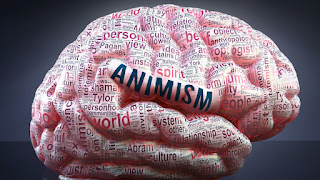The things you get to talking about with friends on Facebook. Or maybe it's just me.
This week, somehow I ended up in a several-days-long Facebook chat with friends from Kevin's Watch about religion -- which to be honest, isn't that unusual with this crowd -- but then I steered the discussion into animism.
 |
| Niceldeas | Deposit Photos |
I discovered some time ago that I'm an animist, partly through my Pagan studies, but also by delving into so many Native American myths. Many tribes have a different attitude from that of Western civilization when it comes to the land. We have historically seen the earth and its resources as Jehovah's gift to us, to use for our benefit -- even to exploit. By contrast, Native Americans generally see the Earth as our mother, and the animals and plants that live here with us as people in their own right, whose qualities are wisdom that we could do well to emulate. These Natives believe we are here not to exploit Earth and her resources but to be good stewards of them. Which is one of the attitudes that made Europeans think, when they first got here, that the Native Americans they met were uneducated and naive -- in other words, ripe for exploitation. (I hope I've gotten some of this across in my novels.)
Getting back to the conversation this week: It then took a turn into a discussion of how we're not supposed to anthropomorphize things. Say you hear one of your cats using the litter box, and then notice that one of your other cats is also paying attention -- and is actually lying in wait to pounce on the poor boy when he gets out of the box. He does, and she does, and he freaks out and dashes down the basement stairs, and she saunters away, her practical joke played. Oh, all right -- it was Pumpkin in the litter box and Squeaker who was the jokester. And the whole thing was hilarious.
But when I recounted this some years ago, I was admonished by someone for anthropomorphizing Squeaker's behavior. I thought the concept was ridiculous at the time, and I still think so. But this week, in remembering this series of events, I came to a realization: Humans, in our hubris, have it backwards. It's not that we attribute human emotions to animals -- it's that every living thing has the same emotions. We know when our pets are happy to see us and when they're jealous of the attention another pet is getting. We know when a wild animal is angry or afraid. We are learning that trees take care of one another, feeding resources through a mycorrhizal network underground to an ailing neighbor tree. We recognize these emotions because we have them, too.
But we can't admit that to ourselves. If we did, it would make humans, Jehovah's chosen ones, equal to every other species on the planet, including the rivers and trees and mountains and the planet herself.
As an animist, I believe we are all equal. We are all persons. And every person deserves respect.
So I've decided that anthropomorphism isn't an actual thing. It's certainly not anything we should avoid doing. In fact, I think we should do it more often. Let's celebrate our similarities so that we're less likely to treat the Earth, and every person on her, as "less than human".
***
These moments of bloggy equality have been brought to you, as a public service, by Lynne Cantwell. Stay safe!

2 comments:
Totally agree, Lynne. Food for thought.
I think so. :) Thanks for stopping by, DV!
Post a Comment